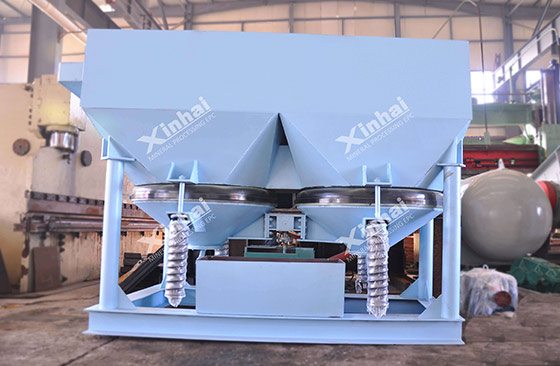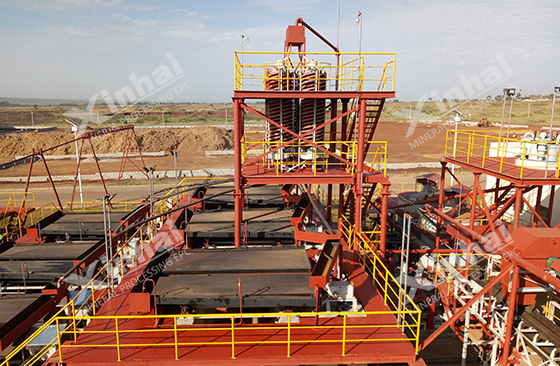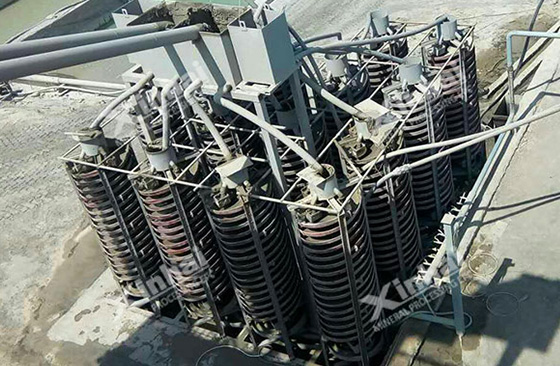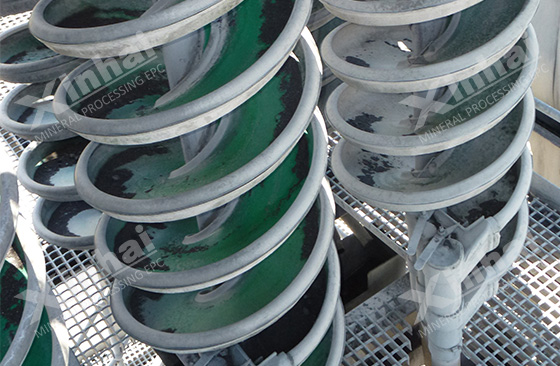
Gravity separation is one of the commonly used beneficiation methods for gold ore. According to different mineral processing equipment, the gold ore gravity separation process can be divided into jig mineral processing, shaking table mineral processing, chute mineral processing and spiral chute processing. Different mineral processing technologies have different types of ores and production costs. The specific mineral processing technology needs to be appropriately adjusted according to the characteristics of the ore to improve the recovery rate of the ore. These gravity separation methods will be elaborated below.
Jig mineral processing is a process in which mineral particles are sorted according to density in the water flow. The forms of water flow can be divided into three types: intermittent rising, intermittent falling, and alternating rising and falling. Nowadays, the main method is to alternate between rising and falling. Jig gravity separation can be divided into two types: moving screen type and fixed screen type according to the water flow mode generated. Fixed screen jig can be divided into diaphragm type and piston type according to the form of medium agitation mechanism. When processing mineral with gravity separation process, diaphragm jigs are often used.

Jig has been used in gold mine beneficiation for a long time and is still one of the important gravity separation equipment. When processing vein gold ore with unevenly distributed gold particles, when the ore discharged from the ball mill is fed into the jig, coarse gold particles can be captured as early as possible. When chute is used to select placer gold ore, the heavy sand concentrate obtained can be selected using a jig.
The advantages of jig gravity separation are: good separation effect, large processing capacity, wide processing particle size level, small factory area, sturdy equipment structure, and easy operation and maintenance.
The shaking table mainly uses horizontal medium flow for beneficiation. The beneficiation process is mainly carried out on a table with a wide surface and a certain degree of inclination. The water flow on the table plays the role of stratification, coupled with the vibration of the shaker, the minerals with different densities are separated into layers and move horizontally or vertically. Shaking tables are widely used in the separation of fine-grained materials. They have a high enrichment ratio and can directly obtain concentrates and tailings. The mineral particles are distributed in a fan shape on the table of the shaking table, and a variety of products can be obtained according to needs. The feeding particle size of the shaking table is below 3mm. Due to the small feeding particle size, the diameter and shape of the ore particles have a great influence on the separation effect. Pre-classification is required when using the shaking table for gravity separation.

Shaking tables are widely used in gold ore beneficiation. After the placer gold ore is separated by a chute or jig, the coarse concentrate is often refined using a shaking table, and the concentrate recovery rate can reach more than 90%. When processing vein gold ore, the shaking table is used for rough separation to prioritize a portion of the gold-containing concentrate. Shaking tables can sometimes be used to sweep amalgams or flotation tailings to obtain part of low-grade gold-containing concentrates.
Chute mineral separation is a method that uses the difference in the movement state of mineral particles in inclined medium flow for separation. The raw ore is fed from the chute head with the water flow, moves downward along the chute bottom and completes the sorting. The chute is a simple gravity separation equipment. It can be used for mineral separation when the density of useful minerals in the raw ore is relatively large, or when the density difference between valuable minerals and gangue minerals is large. Chute is often used for sorting gold, platinum, tin, nickel and other placers. Chute is often used for sorting low-grade placer gold ore, and the recovery rate can reach 60%-90%. However, due to the large amount of labor and time required to clean the sand settling in the chute, it was gradually replaced by jigs and spiral concentrators.

The spiral concentrator is a kind of chute mineral processing equipment. It mainly uses gravity, friction, centrifugal force and water flow to separate mineral particles according to density, particle size and shape. The spiral concentrator consists of a spiral chute, a bracket, an interceptor and a water supply pipe. The slurry is fed from the upper end of the chute and flows downward along the chute in a spiral shape. During the process, the ore particles are stratified. Different products after stratification are discharged from different outlets. The processing capacity of the spiral chute is greater than that of the chute, the separation effect is good, and the amount of labor consumed is small. It can be used for the separation of placer gold ores.

The above are several technologies and equipment used for gold mine gravity separation. In actual production, it is sometimes necessary to combine multiple mineral processing technologies to recover gold, such as flotation, cyanidation, etc. The effect of a single mineral processing technology is sometimes not ideal, so combined mineral processing technology is necessary. How to choose the appropriate gold ore beneficiation technology should be determined based on the characteristics of the ore and production requirements to avoid the waste of ore resources and economic losses caused by unreasonable beneficiation plans.
To find out more about our products and solutions, please fill out the form below and one of our experts will get back to you shortly.